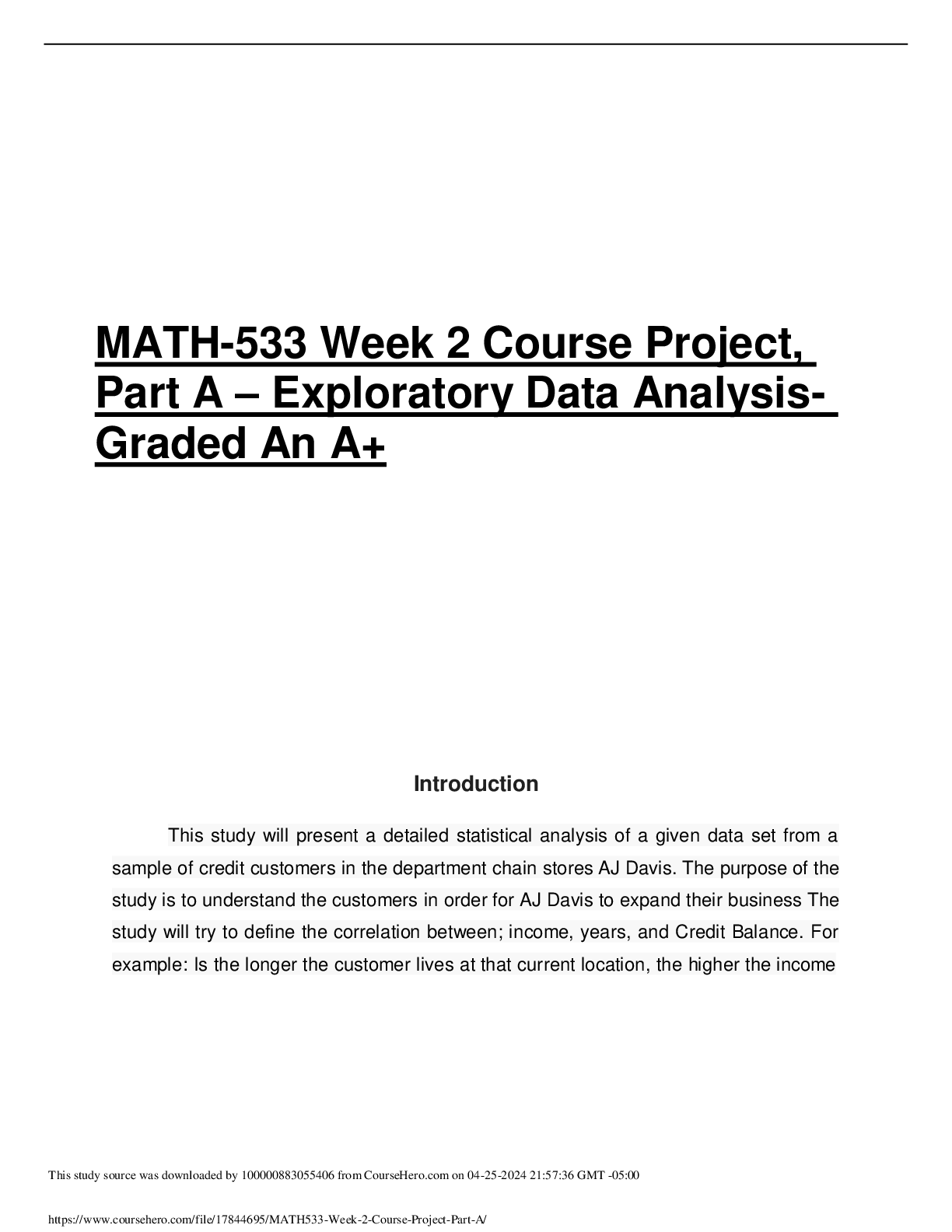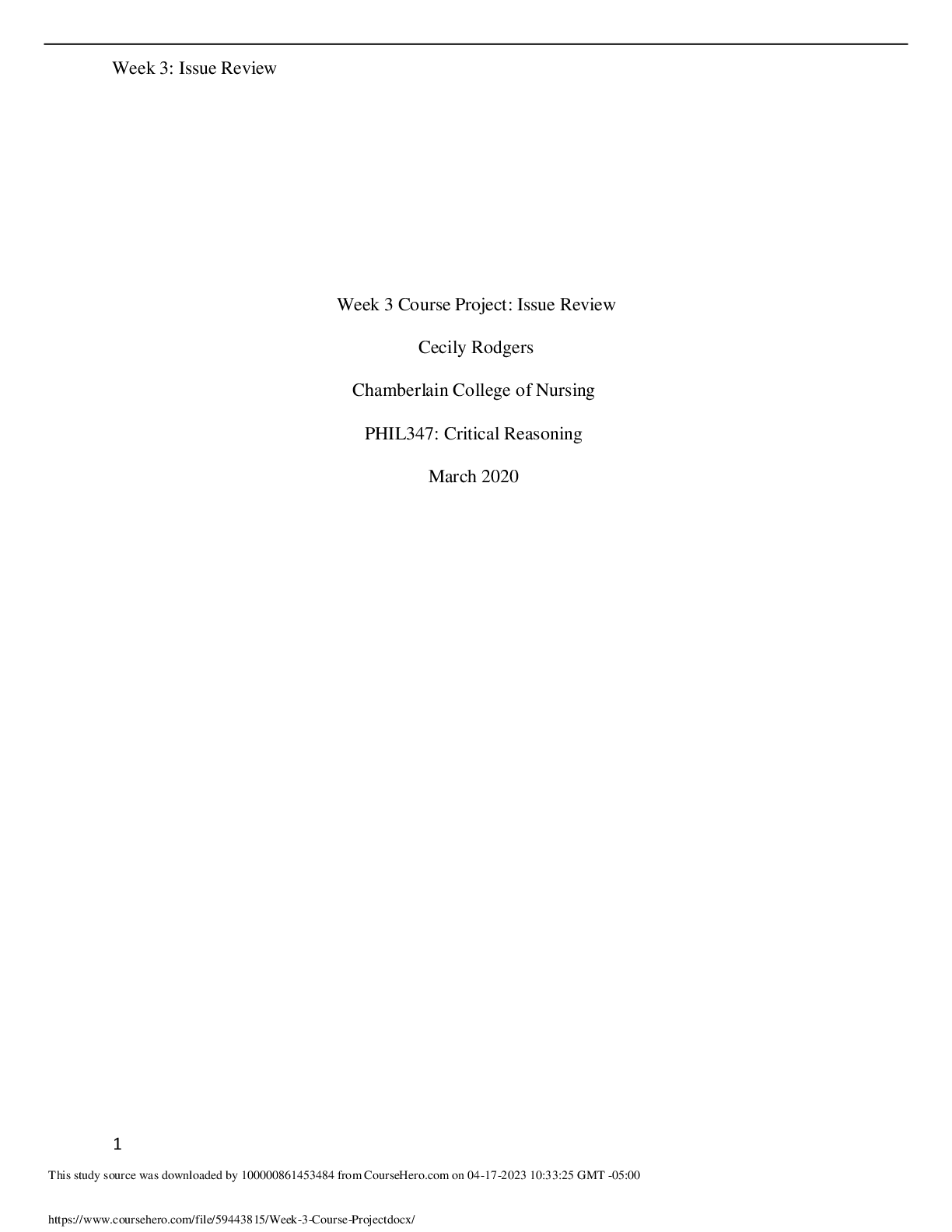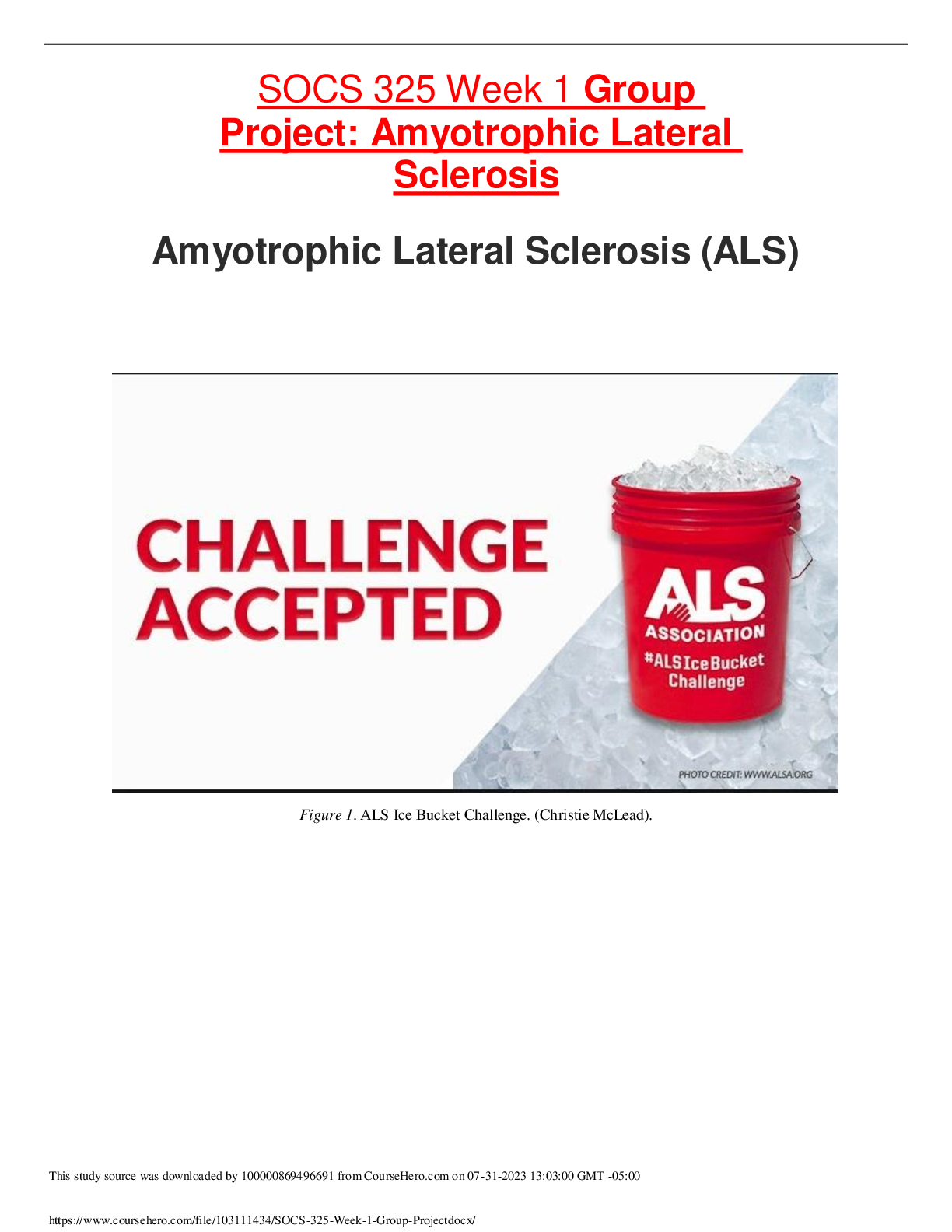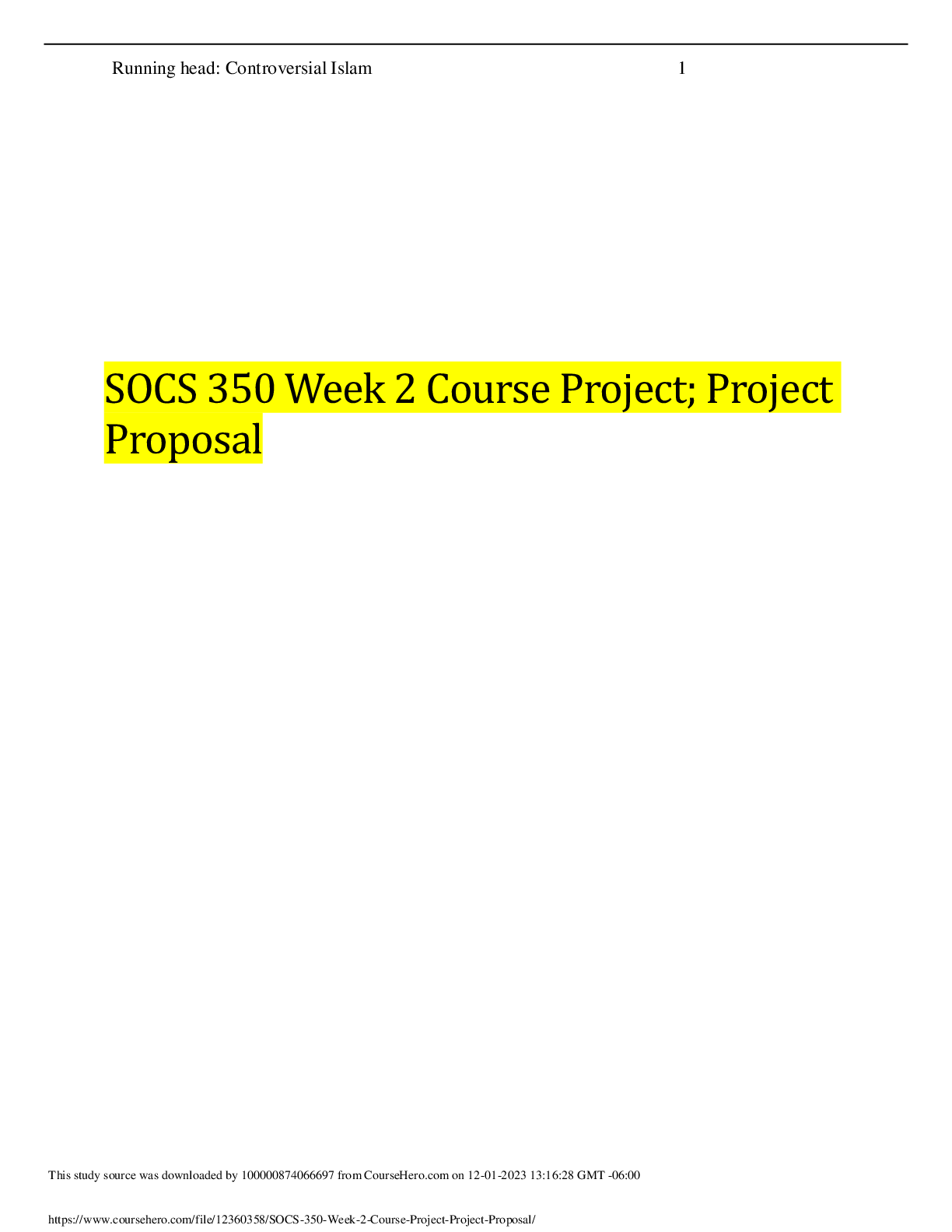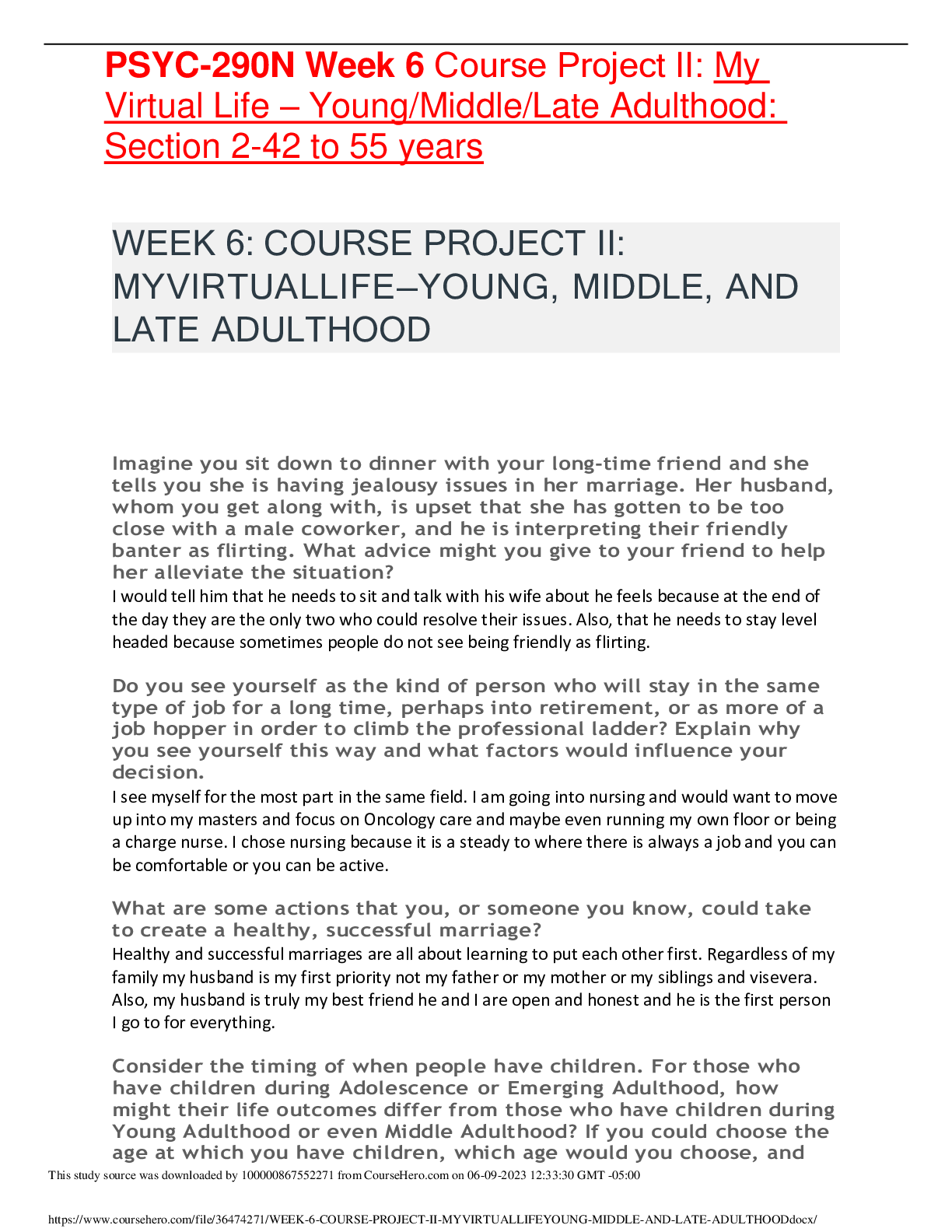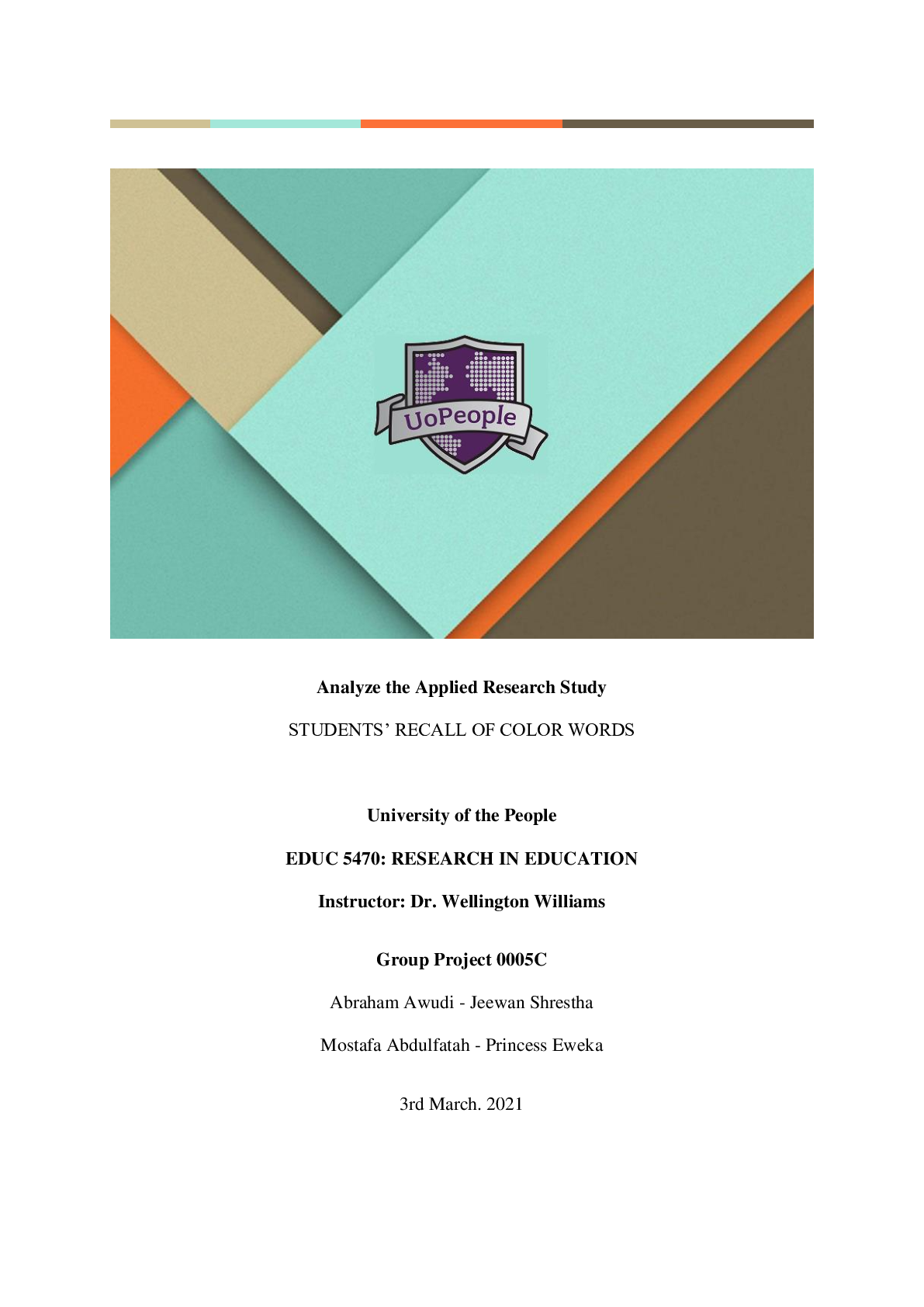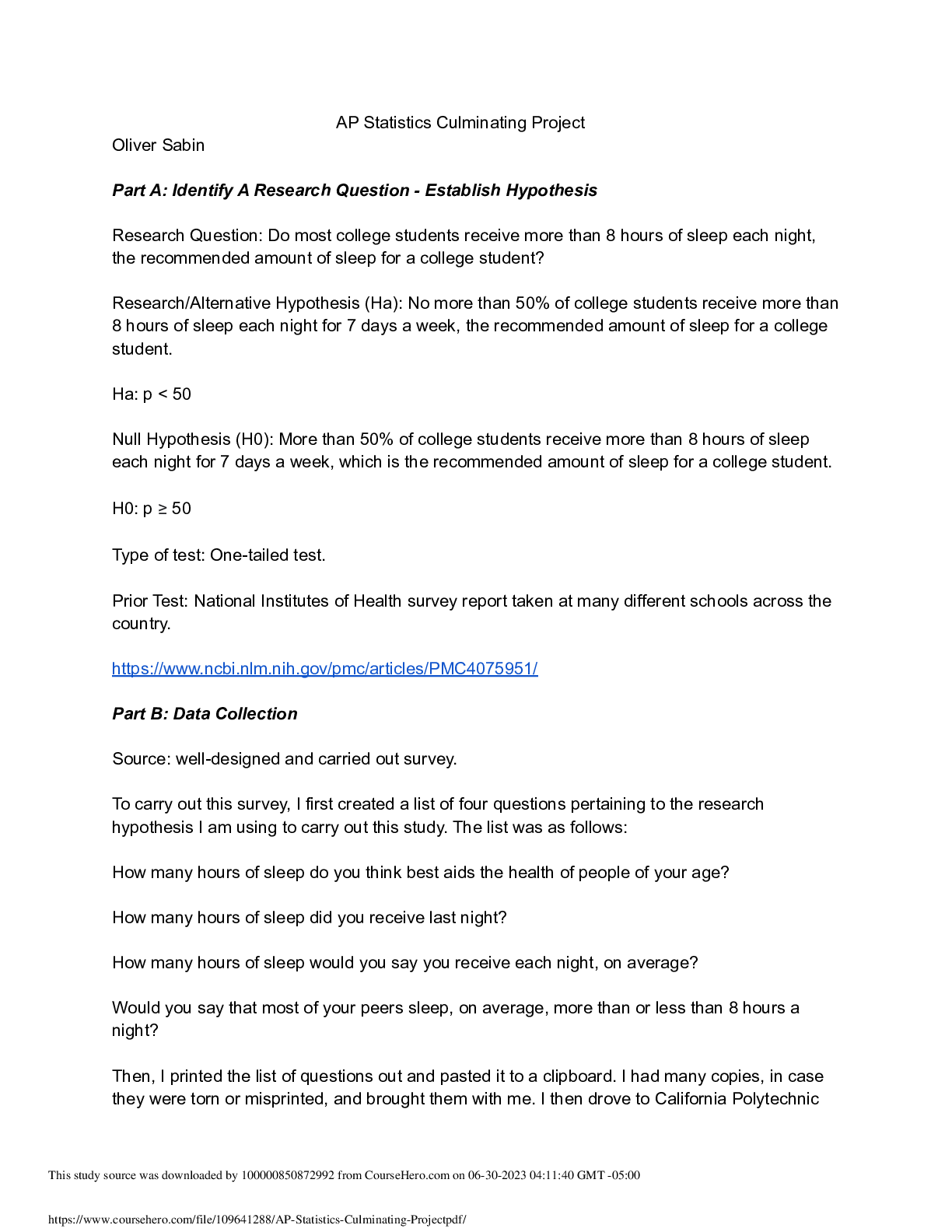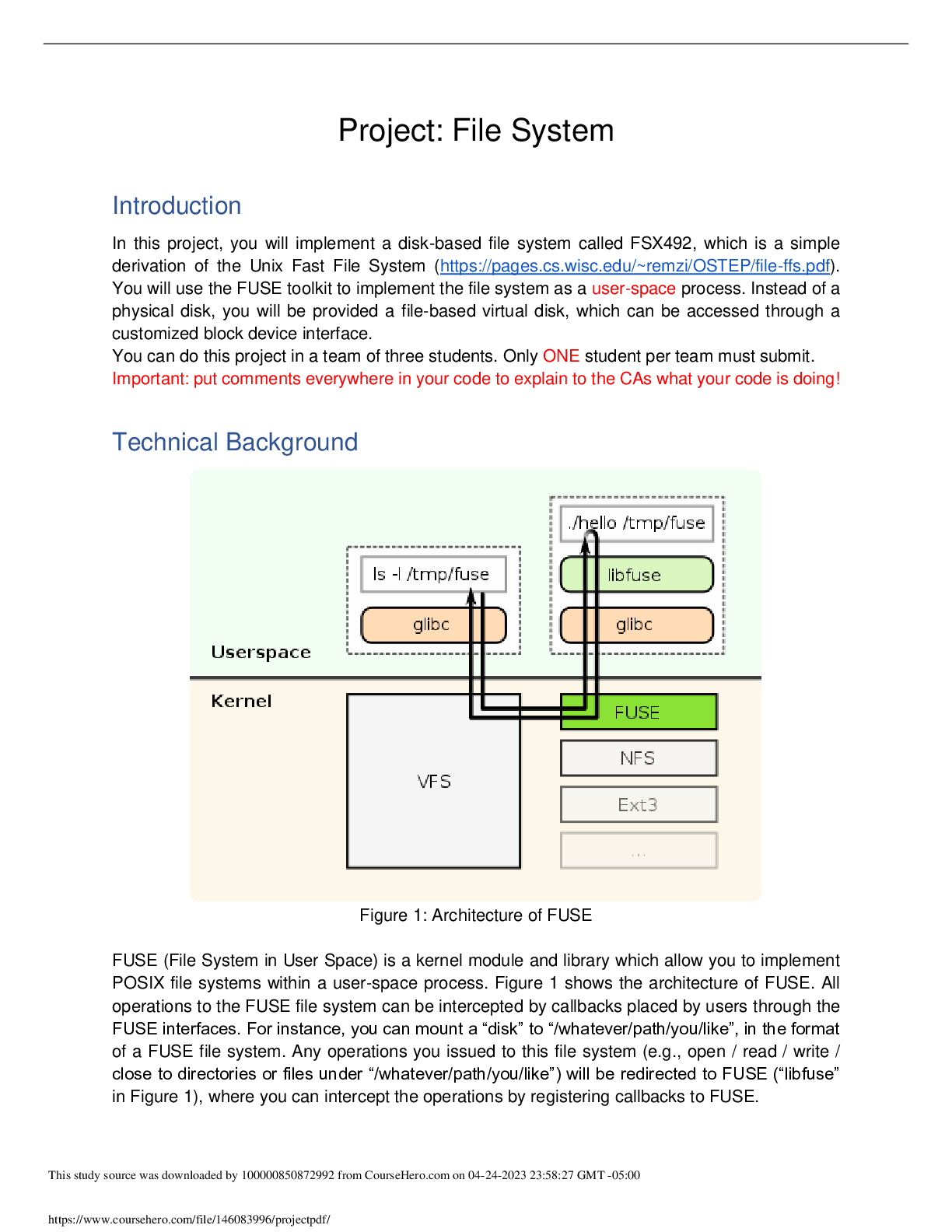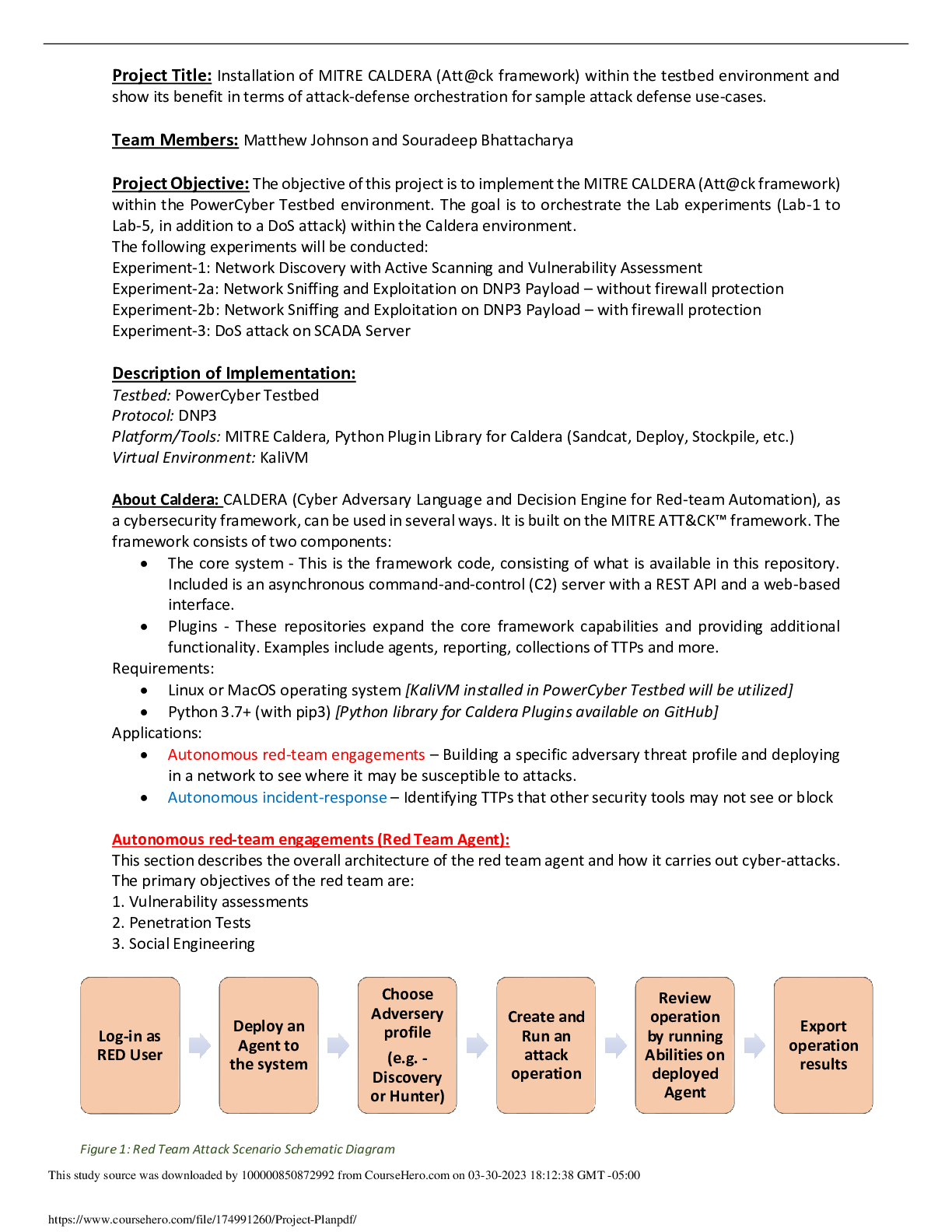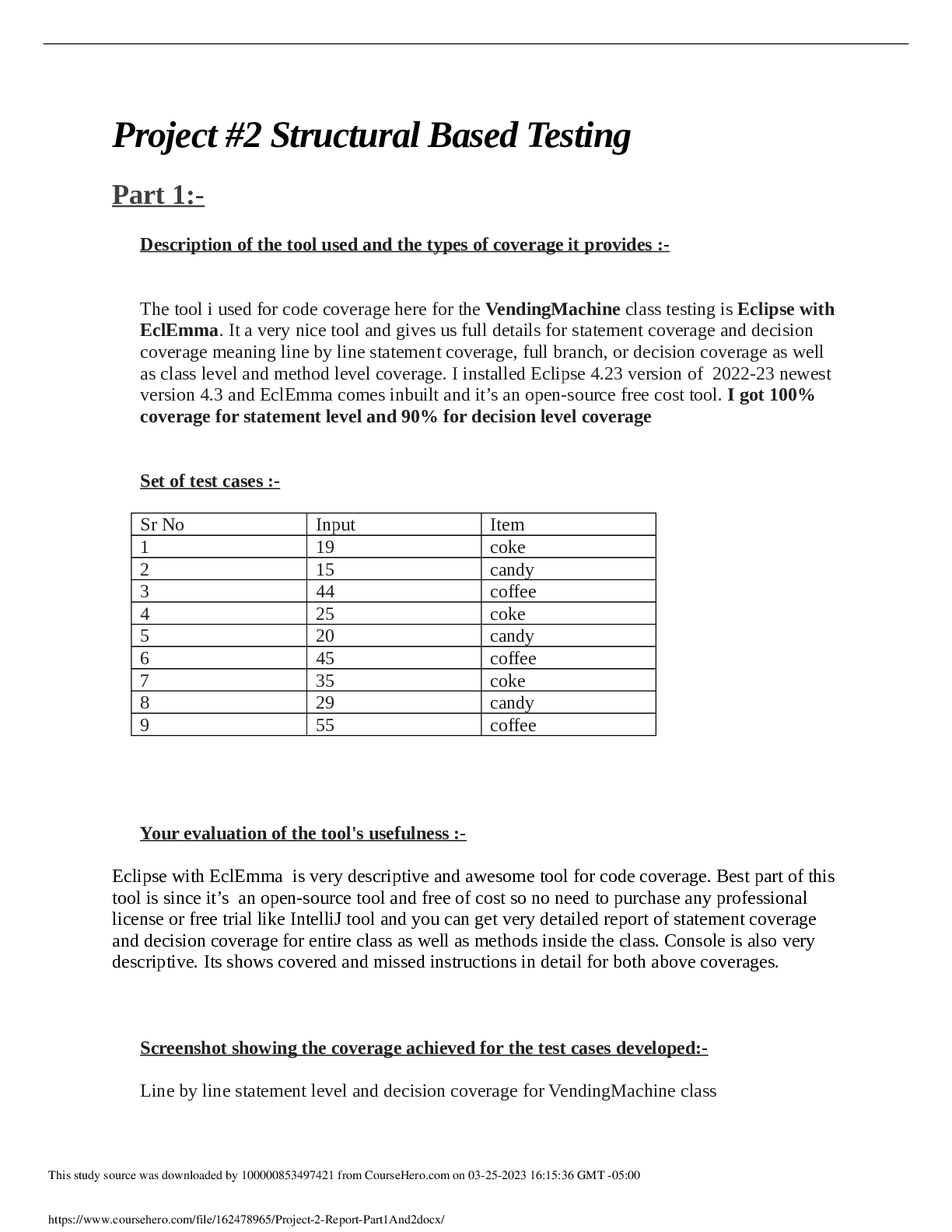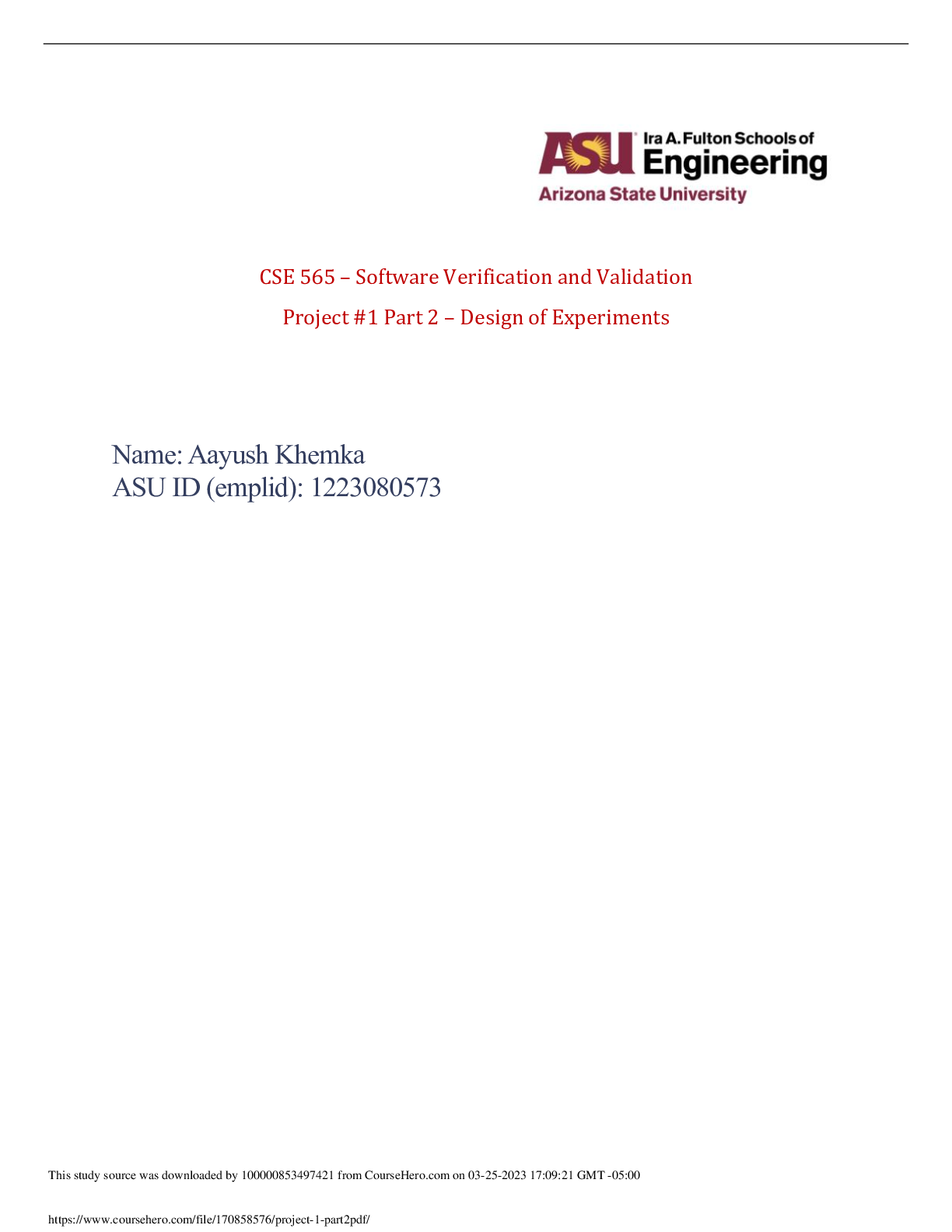Psychology > PROJECT REPORT > PSYC-290N Week 7 Course Project II: My Virtual Life – Young/Middle/Late Adulthood: Section 3-60 to (All)
PSYC-290N Week 7 Course Project II: My Virtual Life – Young/Middle/Late Adulthood: Section 3-60 to 80 years
Document Content and Description Below
PSYC-290N Week 7 Course Project II: My Virtual Life – Young/Middle/Late Adulthood: Section 3-60 to 80 years My Virtual Life – Late Adulthood Regardless of whether you are a parent or s... tep-parent in your virtual life that you are leading, why do you think many parents report difficulties in maintaining or increasing intimacy with their adult children? In your answer, consider that for some parents their children often provide a perceived source of validation of their own beliefs, values, & st&ards. What are some reasons why or how children might resist their parents' desires to maintain a close intimacy with them? When people start transitioning from adolescence to young adults, they start to develop their own beliefs, values, & st&ards, based on their own experiences. These newly formed ideas could be conflicting what their parents believe. The opposing views could create a problematic relationship, rather than an intimate one. These young adults begin to explore new realms in life & they could eventually start to disagree with what their parents have told them in the past. Sometimes older adults hesitate to give their adult children or other family members unsolicited advice or feedback because it might cause tension in the relationship if that feedback is negative. How do you feel about giving younger adults your advice or opinions, particularly if it might cause tension? Are there times when it is appropriate or inappropriate to give someone unsolicited advice? Draw on your own experiences or even your virtual person to provide examples. I feel that it is acceptable to offer advice to a young adult, regardless if it will cause tension. In today’s society, I’ve noticed that younger adults tend to be more tense about almost everything, anyhow. However, most of the time younger adults need that guidance or opinion in their life. Additionally, young adults can be knuckleheads, who require a dose of tough love. But this situation correlates with the saying, “it’s not about what you’re saying, it’s about how you’re saying it.” I genuinely believe that determining whether something is appropriate or inappropriate is subjective. Likewise, I believe that there is always a tactful way of delivering your message effectively, regardless of the situation. Whether that means changing your approach, cooling down for a minute before engaging, or taking a few days to generate a level- headed response, there is always a way. Based upon the theory & research about mid-life crises discussed in your textbook & class, how might you explain a 40-something-year-old family member's sudden change towards unpredictable behaviors & emotionality? When a person experience’s a mid-life crisis, they may allow their insecurities consume them. Examples of insecurities would be feeling as if you’ve done nothing with your life, feeling as if you’ve done things but have nothing to show for, or feeling as if you messed up early on in life & therefore are paying for your actions. For people who succumb to these negative thoughts, they’re constant reminders of what isn’t their reality. These insecurities then provoke people to reflect on their age, how they feel like is almost over for them, & how they want to die feeling accomplished. In turn, this ideology stimulates impulsive & outl&ish behaviors, purchases & emotions. Suddenly a 40-year-old leaves his wife for a younger woman, buys a new sports car, & owns a mansion. How can involvement in civic or religious activity buffer you against stress effects? Give some examples from your personal life. I do & I don’t consider myself a religious person. I do have a religion & I do practice it on occasion. However, I am not as involved as I probably should be, & I definitely bend some of the rules. Nonetheless there are specific times when I turn to religion. For instance, if I have a huge exam coming up or if someone close to me has fallen in bad health, I will turn to religion. I will pray for the situation, pray that God takes the situation into his h&s & provide with the best possible outcome. What are some reasons why you or your friends might continue to work past the age of retirement? Retirement is the time in life where you feel that you have contributed enough to society/workforce, & in turn want society to take care of you, for all the years of work you’ve put in. However, some people choose to past the age of retirement for reasons of their own. A few reason I believe either my friends or myself would work past the age of retirement would be because we’d be bored at home, we need the money, our spouse/partner is driving us nuts, or our spouse/partner died & we’re seeking a distraction. Imagine you are 65 years old & you are experiencing conflicts with your adult children over a number of things: communication & style of interaction; lifestyle choices & habits; parenting practices; values, religion, ideology, & politics; work habits; & st&ards of household maintenance. How might you approach these conflicts or communicate with your children about them? Which differences could you feel at ease with & which would really bother you? I can only assume approaching this situation with 65 years of experience under my belt I would be able to remain cool, calm & collected. I would have to wrap my mind around the fact that my children are adults now, no matter how I view them. They are free to make their own decisions, form their own opinions, make their own mistakes, & be their own person. It's obvious that I would like to see them walk a similar path as I did; however, that's no longer in my control or for me to decide. I'd also be forced to take a step back & reflect on my decisions/actions/views when I was their age. In my emerging adulthood, I was originally going to college to be a teacher, & my parents encouraged that path. Mid-way through my college career, I decided that I no longer wanted to pursue a career in education & switched my studies/focus to engineering. Though my parents were disappointed & tried to convince me otherwise, I stuck with my gut feeling & got an engineering degree. If I didn't make that decision independently, I would’ve never been the Vice President of my company & who knows where I would've ended up? So with that in mind, I would have to respect any differences my child & I may have, & continue to love/support my child. I would also have to keep an open-mind & be willing to accept these differences. What employment problems might an older person face that could be the result of their age? An older person might experience difficulties with the physical expectations of their job. For example, as people age their muscles may atrophy causing a decrease in strength/stamina or they may be suffering from a chronic disease which hinders their physical work performance. Additionally, there are cognitive concerns that may arise. For instance, as people age they may experience episodes of memory loss or decreased ability to function cognitively at top speed. What are some internal & external factors that might contribute to a positive outlook about aging? An internal factor that would contribute to an optimistic outlook about the aging process would be my years of acquired knowledge & wisdom, & reflecting on my successes in life. Because of these things, I feel I would be equipped to pass information on to the future generations. In contrast, an external factor that would continue to bring me optimism would be my family, friends & loved ones. Despite my age, seeing the people I love the most will always bring a smile to my face. According to Nancy Schlossberg, there are multiple paths of retirement that adults may follow. (a) Continuers; (b) Involved spectators; (c) Adventurers; (d) Searchers; (e) Easy gliders; (f) Retreaters. Which of these paths seem most probable for you? Why? The paths I foresee myself taking are that of Adventurers, Easy Gliders, & Retreaters. At this point in life, I would have dedicated 40 years of my life to a career & family. I would feel as if it was my turn to have some fun now. I would want to travel & see the world. I would want to relax whenever I felt like it. I would want to completely indulge in the simple, spontaneous, unscheduled lifestyle, unlike the one I was living for the last 40 years. Lastly, I consider the easy gliders option solely because I have maintained an easy-going disposition thus far. How much & in what ways are older persons like yourself influenced by gender identity beliefs? Do you think that gender issues are of concern for older adults? Gender identity beliefs & gender issues are not something I generally concern myself with. I encourage everyone to be their true, genuine self 100% of the time. People can't love you for you if you don't ever present the REAL you. Moreover, if someone is facing a gender identity issue, then I don't feel that it's anyone else's business & I don't feel that it should be a topic of discussion. Unless that person wishes to address the issue with you, I advise you to stay in your lane. That person's concern isn't affecting your daily life, money, or family, so leave them be. They're obviously experiencing a mental, internal battle, & pushing your opposing opinion on them isn't going to help the situation very much. In fact, you may even make the situation worse. What factors might lead a person to select gender atypical activities & life roles? I believe there several factors that contribute to people selecting "gender appropriate" activities & life roles. A few of these factors include society, cultural beliefs, the era in which you were raised in, & comfort. Some of the best predictors of successful aging are an individual's general outlook on life & his or her ability to adapt to life's events-expected & unexpected! Looking back over your virtual life, which experiences could contribute to successful aging, & which could have put you at risk for unsuccessful aging? I feel as though I have aged successfully through my various virtual life experiences. To name a few, I graduated from college which led me to a successful career, I maintained amazing relationships with my children & siblings, & I was able to work through my marital issues & remain in my marriage. I have also remained fairly healthy given my family's health history. I was able to manage my stress effectively & find motivation, even in the hardest of times. In contrast, there are choices that I could have made which would have led me to age unsuccessfully. I could have divorced my husb&, leaving me stressed & financially unstable. I could have let go of my health & indulged in my guilt pleasures. I could have decided not to go to college & struggle making a decent living. I could have had terrible relationships with my family, resulting in emotional turmoil. What are the benefits of connecting with others throughout life & particularly during Late Adulthood? If you could do your virtual life over, would you do anything differently? The benefits that come with connecting with others during Late Adulthood are cognitive stimulation, memory stimulation, & socialization, which promotes overall well-being. By staying connected & close with others, these are benefits that you get to exercise every day! On the other h&, if I had to do my virtual life again, I would probably choose all different options. I would do this solely because it's virtual & not reality, & I would be interested in seeing where my decisions led me. What model would you use to describe your coping with death & dying? Use your textbook to identify the model & describe how the stages you confront might be played out in your late adulthood years. Comment on previous experiences in your life (in childhood, adolescence, or emerging adulthood ages) which might also contribute to such a response. I would refer to Erikson's theory of psychosocial development to best cope with dying & death. Erikson touches on the idea of reminiscing & how it is beneficial to reminisce about the past (Boyd & Bee, 2015). Talking about these issues aloud can aid in the recovery process, as well. I also feel that Erikson's theory promotes celebrating the life that once was, versus mourning the loss of life. In January 2018, I lost my gr&pa to congestive heart failure. This loss hit me really hard. Instead of talking to someone about my grief, I bottled it up in fear of looking weak & in the end, I fell into depression. However, once I let go of my pride & came to terms with the fact that I needed to face these feelings, head on, I found myself able to cope in a more positive way. Do you expect to have a sense of ego integrity or ego despair as you move into & through late adulthood? What might make you more or less likely to have a sense of integrity? What decisions might you have made either now or in your virtual past to cope differently with either negative or positive experiences you have had in your virtual life? Erikson referred to this stage as "integrity vs despair" in which people begin to reflect on their lives (Boyd & Bee, 2015). During this reflection, people begin to associate meaning to their past experiences & decide whether they've lived a life full of meaning or not (Boyd & Bee, 2015). Personally, I think I will have ego integrity as I progress in age. I truly feel that the path I am on will take me far, & my family will be taken care of. This will allow me to associate depth with my experiences & have little to no regrets. Why are siblings such an important factor in elderly individuals having successful coping skills? Does this mean that aging persons without siblings (either due to loss or perhaps because they were an only child) are more at risk for problems in coping with aging? How might only children compensate for lacking siblings & have positive outcomes in later adulthood? Having a sibling in your latter years is an important mechanism in the ability to cope. As friends & family begin to die, your siblings are the only remaining people who have been on the journey of life with you, from childhood to now. Having them around, especially after losing a parent, can absolutely be a powerful tool when having to cope with a loss. In contrast, elderly adults who don't have sibling relationships may find themselves feeling lonely & depressed. However, perhaps they have another relative (i.e. cousin, aunt, uncle) that is sibling-like & can console them during their rough time. As a projective assignment, write your own obituary about your virtual life. What significant others in your life remain after you? What would you list as your meaningful moments or accomplishments, either those addressed within this virtual life course, or drawn from experiences not mentioned previously? You can write this from an observer's point of view (third-person), or from your own perspective (first-person) as an autobiographical letter. Your instructor will provide you with more details about this assignment Briana Maduray-Zepeda, 81, died on August 23, 2019 at her home in Las Vegas, NV, from natural causes. Mrs. Zepeda was born on June 26, 1938, in Los Angeles, California to Klint & Lucile Maduray. She was a profound human being, who was loved & respected by so many. She touched the lives of thous&s & cared a great deal for others. She was a remarkable person, who was selfless & determined. If anybody was to try & tell her "she couldn't", she was determined to prove them wrong. Her energy lit up the room, her smile & always-positive mindset were infectious. Though we will miss her dearly, she has left us with a few requests. Mrs. Zepeda has requested for family, friends, colleagues & everyone else in attendance to celebrate her life, & all the memories you've shared together. Briana has asked for minimal tears to be shed, & encouraged more smiles to be present in the room than frowns. As we all know, she hated when people were upset & was persistent on turning their day around, even if it was in the smallest way. Mrs. Zepeda was an astounding person, who is irreplaceable & will be forever engraved in our hearts. Briana is survived by her husb& David, daughter Hannah, son Will, sister Gwen, & brother Jack. Reference Boyd, D., Bee. H. (2015). Lifespan Development (7th ed.). Upper Saddle River, NJ: Pearson Edition [Show More]
Last updated: 10 months ago
Preview 1 out of 7 pages
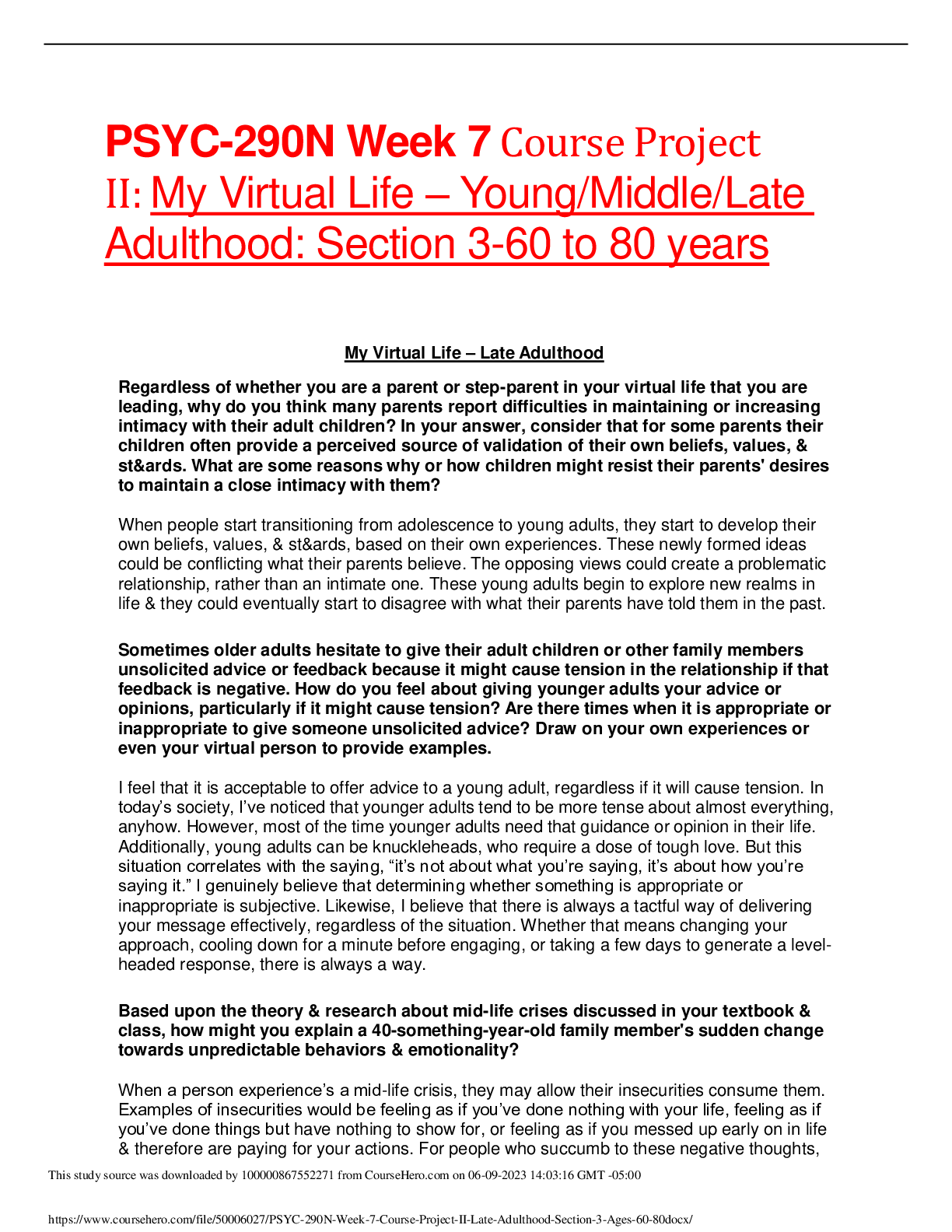
Reviews( 0 )
Document information
Connected school, study & course
About the document
Uploaded On
Jun 10, 2023
Number of pages
7
Written in
Additional information
This document has been written for:
Uploaded
Jun 10, 2023
Downloads
0
Views
62


